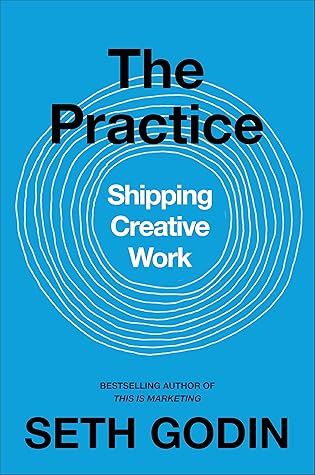More on this book
Community
Kindle Notes & Highlights
you
are after, you can politely walk away from it. If the audience you’ve worked so hard to build trust with is making it clear that your vision doesn’t match theirs, you can move on. It’s fine to experience regret when we abandon a sunk cost. It’s a ...
This highlight has been truncated due to consecutive passage length restrictions.
The stories he created, the robots and the rest, were the bonus that came along for the ride. He typed when he wasn’t inspired. The typing turned into writing and he became inspired. We don’t write because we feel like it. We feel like it because we write.
Flow is the result of effort. The muse shows up when we do the work. Not the other way around.
Set up your tools, turn off the internet, and go back to work.
If you want to complain that you don’t have any good ideas, please show me all your bad ideas first.
Jones turned her patents (she had more than any other woman of the 1800s) into the Women’s Canning and Preserving Company, which was 100 percent owned and staffed by women. In the first three months, they shipped 24,000 orders. The assertion that fruits could be canned without losing flavor was made years before she figured out how to do it. The brave act of building a significant women-owned and women-staffed company was put in place long before the orders arrived. The practice demands assertions when there are no guarantees.
Assertions are the generous act of seeking to make things better.
An assertion is a promise. A promise that you’ll try. A promise that you’ll ship. And a promise that if you fail, you’ll let us know why.
An assertion is not a statement of authority. Managers have authority, so they don’t need to make assertions; they simply make announcements.
Mundane doesn’t mean what I thought it meant. The word “mundane” actually refers to the real world: the practical, skills-based, reality-focused truth of the world around us.
not something you’re born with. In fact, there were two key differences between great competitors and good ones: Skill. The best swimmers swim differently than the ones who don’t perform as well. They do their strokes differently; they do their turns differently. These are learned and practiced skills. Attitude. The best swimmers bring a different attitude to their training. They choose to find delight in the parts that other swimmers avoid. This is their practice.
saying. The line between an amateur and professional keeps blurring, but for me, the posture of understanding both the pioneers and the state of the art is essential. Skill is earned.
isn’t enough money. But without constraints, we’re left with no tension and no chance for innovation or surprise.
Because expectations were so low, the cast and writers had very little oversight. Precisely because no one was expecting very much, they got away with quite a bit.
Trusting yourself doesn’t create overconfidence, because you’re focused on the process, not on making promises you can’t keep.
Don’t sabotage the work by ignoring the practice. Trust yourself to find a way forward, but seek out the resilience you’ll need to persist as the practice continues.
No one can possibly do a better job of being you than you can. And the best version of you is the one who has committed to a way forward. Your work is never going to be good enough (for everyone). But it’s already good enough (for someone). Committing to a practice that makes our best better is all we can do.
The path forward is about curiosity, generosity, and connection. These are the three foundations of art. Art is a tool that gives us the ability to make things better and to create something new on behalf of those who will use it to create the next thing. Human connection is exponential: it scales as we create it, weaving together culture and possibility where none used to exist.


